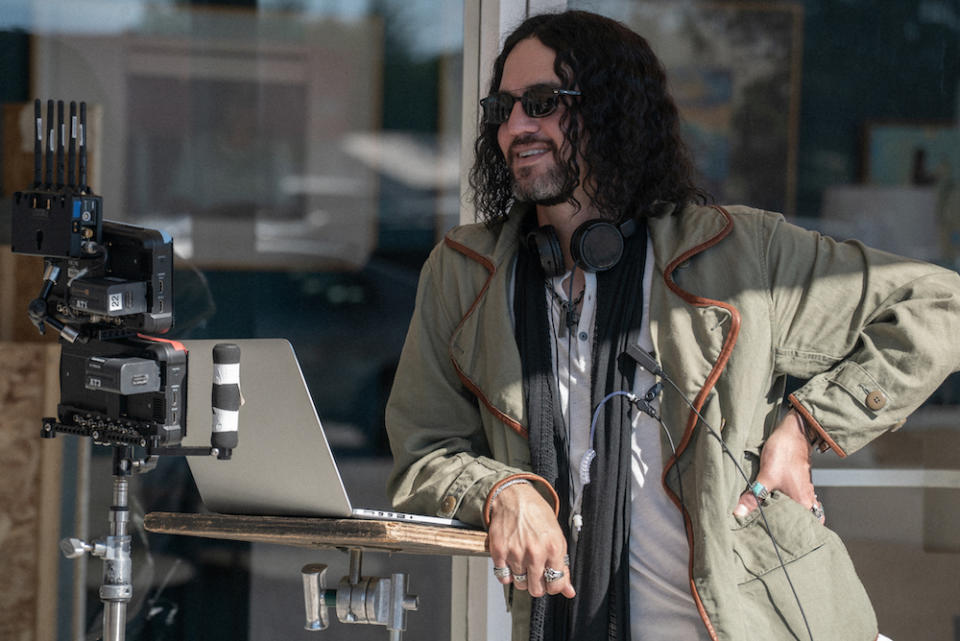‘The Curse’ Is an Exquisite, Excruciating Black Comic Wonder


At the onset, before enough time has passed for anything to go awry, Asher (Nathan Fielder) and Whitney Siegel (Emma Stone) play up one predominant truth of their home improvement project: There are no losers. Asher recites the assertion like a mantra, and really, who could blame him? The newly married couple moved to the struggling New Mexico community of Española not just to build a life for themselves, but to better the entire town. Whitney’s passive homes are eco-friendly; she designed them to carry a negligible environmental footprint, and she’s working to tear down old, abandoned houses that will be replaced with her new, dynamic homes. Asher handles the paperwork — buying and selling, construction contracts, etc. — and together, they’re shooting a pilot for HGTV that will spread the word about sustainable living to communities nationwide.
Until… the curse. While trying to pick up extra B-roll for Dougie (Benny Safdie), the show’s producer, Asher accidentally offends a local girl named Nala (Hikmah Warsame). Standing up straight and looking him dead in the eye, Nala curses Asher — “I curse you,” she proclaims — and slowly, steadily, over the course of 10 episodes, that becomes the plain and simple truth behind Asher and Whitney’s project. They’re cursed. Or, perhaps, they are the curse. After all, when it comes to enterprising Americans inserting themselves where they don’t belong, someone always loses. Asher and Whitney may need to believe otherwise in order to maintain their guise as righteous benefactors, but “The Curse” eviscerates their false reality at every turn. There are many losers here, in every sense of the word.
More from IndieWire
Told over 10 hourlong episodes, “The Curse” puts Fielder’s trademark cringe comedy to magnificent use while evolving his reality-adjacent filmmaking style. The series is painful to watch. Asher, Whitney, and Dougie are embarrassed and embarrassing in equal measure. They’re desperate to be seen as “good” white people, even as they actively gentrify a town defined by its Hispanic and Native American citizens, and their willful ignorance is the source of endless gasps, groans, and guffaws. Some scenes, like when Asher takes advantage of his friendship with a former colleague, could fit seamlessly into episodes of “Nathan for You” or “The Rehearsal.” The comedy and tension stems from how far Asher is willing to go to get what he wants — and how awkward he becomes during the requisite social interactions.
But unlike those shows, “The Curse” is fully scripted. Fielder and Safdie wrote every episode (with co-executive producer Carrie Kemper serving as co-writer twice), blending the distressing laughs Fielder expertly exhumes with the grounded urgency Safdie so often lives in. The duo prove a perfect match, each building off the other to create unforgettable scenes and impressive character arcs, all while drawing out an eerie vibe to match the sinister motives of our foolish leads.
Whitney dreams of being seen as more than an entrepreneur, routinely describing her homes — whose glass facades reflect the world around them like a funhouse hall of mirrors — as works of art themselves. (That the art world sees her designs as a blatant rip-off of a more prominent artist is an opinion she deletes from her mind, as well as her Instagram comment section.) The genial one in the couple, she coaches Asher on what to say and how to say it. You can practically see Whitney working him like a puppet during joint interviews, as he parrots the prearranged talking points and they both smile soullessly into the camera.

“The Curse” finds consistent humor within its central couple’s glaring contradiction: They’re eager to be famous for the “good” they’re doing, and yet they’re terrified of being seen for who they really are. Whitney hides her relationship with her family, afraid of being lumped in with her “slumlord” parents (played by Corbin Bernsen and Constance Shulman), and Asher… well, Asher hides a lot of stuff.
Fielder, who directs seven of the 10 episodes, draws out the Siegels’ entrenched anxieties through his cinematography, regularly positioning the camera outside windows, inside an unnoticed car, or behind a nearby wall, curtain, or patron. Someone is always watching Whitney and Asher, even in their most vulnerable moments, which can work to empower the audience. We’re sneaking a peek behind the curtain of TV stars, of social media celebrities, of our boastful, self-righteous neighbors, and every time we do, they get cut down a peg — except, that is, when we’re cut down a peg, too. White audiences, in particular, may notice their own virtue-signaling behavior taken to task along with Whitney and Asher. To say much more would risk spoiling the surprises waiting in nearly every episode of “The Curse,” but Fielder and Safdie unveil their grand vision with admirable confidence, precision, and swagger. Laughing at the Siegels can be a giddy, addictive experience, just as seeing yourself in their distorted mirror can leave you flattened and nervous, yet still eager for more.
As much credit goes to the direction and scripts (which get bolder and more imaginative as the episodes progress), just as much praise has to be given to the performers. Safdie, hot off this summer’s big-screen turns in “Oppenheimer” and “Are You There God? It’s Me Margaret,” keeps the streak going with a devilish yet soulful turn as Dougie. A reality TV producer unafraid to employ every trick in the book, Dougie’s desperation stems from a deeper place than Whitney and Asher’s, and Safdie draws out his interiority with long, lingering scenes that patiently wait for the truth to come out. Stone, meanwhile, is on fire. With a smile permanently plastered from ear to ear, Whitney almost never lets her guard down, and instead puts on whatever face best suits her audience. Seeing both sides — often one right after the other, whenever the camera rolls and cuts — is hilarious in Stone’s hands, but she never loses touch with Whitney’s core self. You can see the gears turning at every moment, and the actor composes a complex machine behind those beaming eyes.
That leaves Fielder, who’s never taken on a scripted role this substantial, with the unenviable task of acting opposite an Oscar winner, and the dry, gawking comedian rises to the challenge. There’s a fascinating aura around Asher, in part because of the frustrated anger buried under Whitney’s heavy coaching, but also because of Fielder’s curiosity and commitment. Like “The Rehearsal,” little details help shape the character — the notes he takes, what he listens to while driving, etc. — but he’s also called on to go BIG in a number of make-or-break scenes, and Fielder is riveting each and every time. Just when you think you know what he’ll do or say, he pivots, but like Stone, he never steps outside Asher’s defining traits. You’re with him every step of the way, even when it hurts.
Like its co-creators’ past work, “The Curse” will not be for everyone. Cringe comedy is a niche genre, and even if you’re able to appreciate the series’ caustic commentary, you may be too uncomfortable to hear its message through to the end. I hope not, though. “The Curse” puts a lot on its plate — casting aspersions on reality TV and the entertainment industry at large, cultural erasure and cultural appropriation, classism and social media — but if I had to sum it up succinctly, I’d say it’s about people inserting themselves where they don’t belong. In America, a country built on top of its native people, that’s a thorny subject to examine, especially in its modern form. But Fielder and Safdie prove yet again to be masters of wielding excruciating discomfort toward enlightening results. Don’t lose out.
Grade: A
“The Curse” premieres Friday, November 10 on Paramount+ with Showtime and Sunday, November 12 at 10 p.m. ET on Showtime’s linear channels. New episodes will be released weekly.
Best of IndieWire
Sign up for Indiewire's Newsletter. For the latest news, follow us on Facebook, Twitter, and Instagram.

 Yahoo News
Yahoo News 
